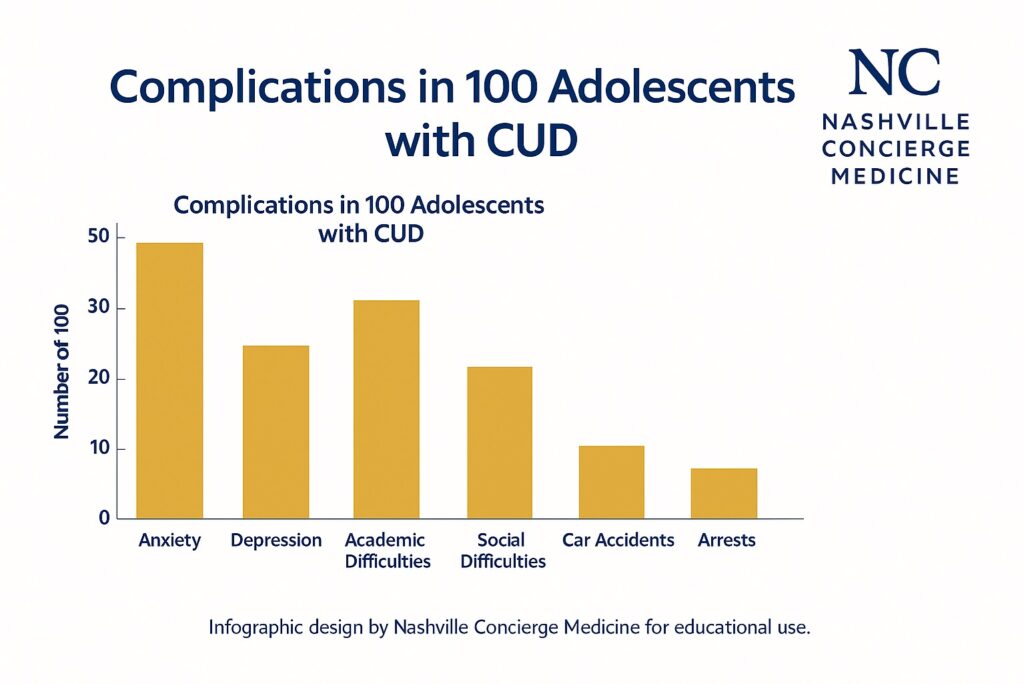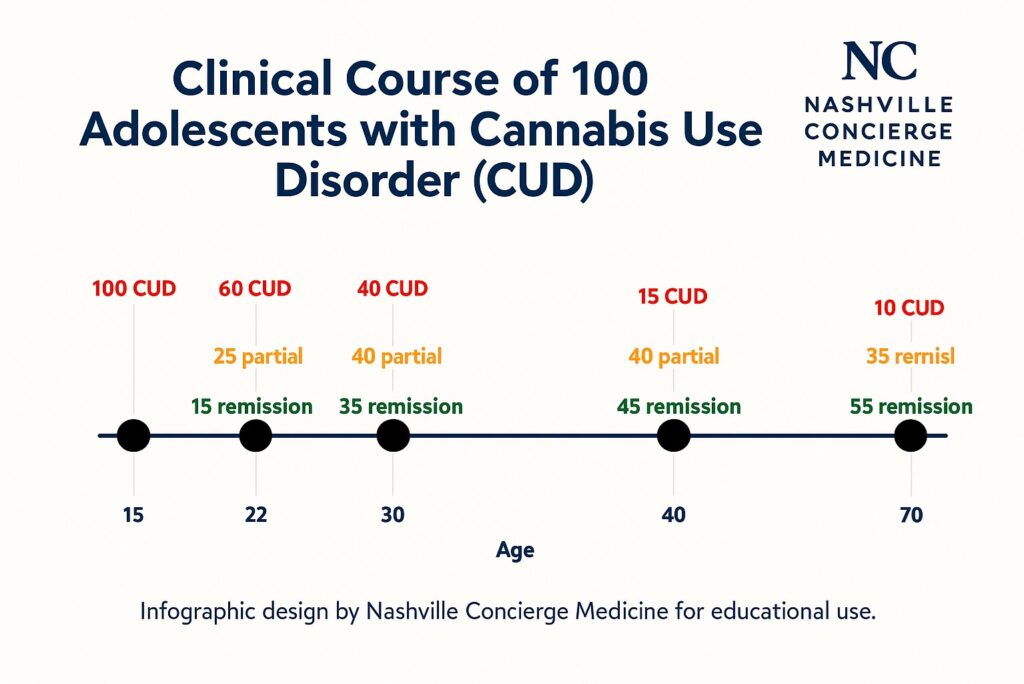Cannabis Use Disorder
My name is William Conway, MD. I am a general internist with a subspecialty in addiction medicine. I have practiced addiction medicine since 2012, and I come from a place of understanding and respect. Your improved quality of life is my priority. My current addiction treatment practice is Suboxone+Primary Care™ in Nashville. My current practice of general internal medicine is Nashville Concierge Medicines.
Cannabis is both complicated and controversial. To provide you with key take-home messages, I, Dr. Conway, will write several blogs on cannabis.
Executive Summary of Cannabis Use Disorder (CUD)
- Cannabis Use Disorder is the continued use of cannabis in spite of significant negative consequences in a person’s life.
- One in five people who use cannabis will qualify as having CUD at some point in their lives.
- 25% of these will eventually develop severe CUD, which seriously impacts work and relationships.
- Risk factors for developing CUD include starting cannabis use early, using high-potency cannabis, and being a very frequent user (20 days or more per month).
- Long-term use- especially beginning early in life- can actually permanently decrease intelligence.
- The good news is that the natural course of cannabis use over the lifetime shows that most users will eventually quit cannabis use. A few will continue using heavily. There is hope for anyone who wants to quit.
Defining Cannabis Use Disorder
In my practice, I hear all the time how it all started as “just a bit of weekend fun.” It was something done at parties to make you feel a little less socially anxious. Before long, it was something you sometimes did to help you calm down before bed, or before a test, or before a date. And then it was something you HAD to do to calm down before bed, or before a meeting, or before an outing. Maybe a close friend mentioned some concern, maybe a girlfriend or a spouse or a parent. But it was easy enough to brush off those concerns. After all, you felt sure it wasn’t a problem.
And it wasn’t a problem. Until it was.
Cannabis Use Disorder, or CUD, is an addiction to cannabis. It is a condition that we are seeing increasingly in our Nashville practice. Someone with CUD will continue to use cannabis despite the negative effects that it has on their lives. This tends to look first like trouble with school or work and then drift into problems with career goals and relationships. Down the line, it can also include health problems, as well as symptoms of withdrawal when trying to reduce use or quit.
Developing CUD in Nashville
Lots of people will try cannabis at some point in their lives; this is especially true in Nashville, given our popularity as a hub for music and fun. Usually, this first event is during adolescence or early adulthood. It seems almost like a “rite of passage” for teenagers and college students. It’s that ever-present guest at any party for young adults, the go-to drug for non-druggie types. It’s the one we assume we can try without a whole lot of blowback… after all, it’s not particularly addictive, right? It’s legal almost everywhere, right? It doesn’t make you feel angry or aggressive or otherwise dangerous, right?
But maybe those aren’t the only questions we should be asking about cannabis. Yes, a lot of people will try cannabis at some point. But of the people who DO try it, about one in five will go on to develop CUD. Most people who experiment with cannabis are able to use it only occasionally, or to quit completely before it causes much trouble. But for the other 20%, cannabis use becomes a real problem.
And of those who do develop CUD, one in four will experience severe CUD, which is characterized by significant negative impacts on academic or work life, as well as on relationships. It’s impossible to tell, early on during cannabis use, whether you will fall into one of these categories. Yes, most people can use cannabis here and there, and not have it disrupt their lives. But for others, cannabis use becomes a serious hurdle. It dampens growth and stalls emotional maturity. Becoming a happy, functioning adult requires a great deal of both things, and cannabis use can derail your life. (Note: if you are experiencing a life-threatening emergency, please call 911 or go to the nearest emergency room in Nashville, such as the Vanderbilt Emergency Department or TriStar Emergency.
What are the Risk Factors for Developing CUD?
Of course, using cannabis is common. And the jury is out on who exactly will go from being a “weekend user” to a person with a real problem. There are some known risk factors for developing CUD. The Big Three are: starting use early (especially as a teenager), using high-potency cannabis, and being a daily or almost-daily user.
Starting cannabis in adolescence- or even in early adulthood- is especially dangerous given the continued development of the adolescent brain. We know this. The brain isn’t considered fully developed until around age 25. (This is the reason you can’t rent a car until then!) Given that most people start using cannabis during this age bracket, take warning: This is an especially dangerous time for a developing brain to start using any drug for any reason.
What are Some Long-Term Effects of CUD?
We all know that long-term cannabis use can delay emotional maturity. But this isn’t just some imaginary loss of growth or intelligence. There are real, quantifiable numbers to support this. There are studies that determine that long-term use of cannabis can lead to decreased intelligence and neurological issues.
So, what does the research show? A well-known study has shown that chronic cannabis use actually decreases intelligence by about 8 IQ points. A loss of IQ can have real consequences in life, from how well you do in school to how much money you make at your job later on. This delay in professional development can have a real financial impact on how you do throughout your life. Start adding up all that (unrealized) money lost from having pursued a career using the peak of your intellectual potential, and there you have it. Higher education is the domain of those who are working to their full potential. We can all agree that someone with CUD doesn’t fall into that category.
Chronic use also increases your risk of mood disorders. Again, that might sound benign, but mood disorders include the very real and sometimes debilitating struggles with anxiety, depression, and psychosis. These problems can further affect job performance, as well as all aspects of your relationships.
Anxiety in people with CUD is two to six times more common than in non-users. Chronic users are also three times more likely to have depression, and more likely to commit suicide. Symptoms or psychosis are sometimes thought of as a temporary side effect of cannabis use, but studies are showing that chronic use is associated with more permanent psychosis as well.

At Nashville Suboxone+PrimaryCare™, we see patients with these complications.
The Natural Lifetime Course of CUD
There is reason to be optimistic! In a group of 100 people who develop CUD, about half will eventually quit cannabis completely by late middle age. Many more will begin using less cannabis as the decades pass. However, 25% of them will continue to experience the negative effects of CUD into their 40s. And 1 in 10 will still be struggling with CUD at the age of 70.

These numbers translate into real life outcomes. Fully half of people with CUD will have trouble in school, which translates to trouble at work and often a lower income than people without substance use disorders. Struggles with depression and anxiety are common. As are car accidents, which are a very real danger for people with CUD, as the risk of a traffic accident while taking cannabis are twice as high as when no cannabis is used.
Hope
So how does a person mature from “weekend user” to fully functioning member of society without stalling out in a stage of CUD? Or how does one recover from a use disorder once that addiction has taken hold?
Well, there’s lots of hope.
For background, for many users of cannabis, emotional development and the responsibilities of adult life will naturally lead to a decrease in cannabis use. Rates of CUD peak in early adulthood, with many users eventually “growing out of it” as the needs of their loved ones and their work responsibilities begin to take higher priority. They find the strength to move through life without this coping crutch.
However, other users find that they do not grow out of their cannabis use. These people often have other issues going on, such as depression or anxiety. They are also likely to be long-term users who began early in life and who use cannabis almost daily.
It’s all about next steps. It’s all about what you choose to do now.
Conclusion
For many users of cannabis in Nashville and throughout Tennessee, the day-to-day requirements of adulthood will make cannabis use less appealing or less practical. For others- those who are either on the path to CUD or who are there already- help will be needed to decrease cannabis consumption or to quit completely. If you need this kind of help, you’ve found it! I, Dr. Conway, have spent half a lifetime helping to meet the needs of people who are struggling with addiction.
Life is about choices. In my clinic, Nashville Concierge Medicines, I respect your personal freedom and your judgement. I listen to you and work with you to give you real-life medical options for you to consider. Please reach out to my Nashville clinic today. Your quality of life is my priority. There is hope!
Dr. William Conway is a board-certified addiction medicine specialist practicing in Nashville, Tennessee
CTA: Start Suboxone+Primary Care™ Today
👉 Call 615-708-0390 | Office & Telemedicine Appointments in our Nashville Clinic
References — New England Journal of Medicine
- Gorelick DA. Cannabis-Related Disorders and Toxic Effects. New England Journal of Medicine, December 14, 2023; Vol. 389(24):2267-2275.
- Correspondence: Cannabis-Related Disorders and Toxic Effects. New England Journal of Medicine, 2024; Vol. 390(9):867-868.
- Brubacher JR, et al. Cannabis Legalization and Detection of Tetrahydrocannabinol in Injured Drivers. New England Journal of Medicine, January 13, 2022; Vol. 386(2):148-156.
- Correspondence: Edible Cannabis Legalization and Unintentional Poisonings in Children. New England Journal of Medicine, August 25, 2022; Vol. 387(8):757-759.
- Sen G, et al. A “Hot” Cardiomyopathy. New England Journal of Medicine, April 3, 2025; Vol. 392(13):1335-1342.
- Correspondence: Reporting Adverse Events for Cannabis to the FDA. New England Journal of Medicine, January 2, 2020; Vol. 382(1):98.





